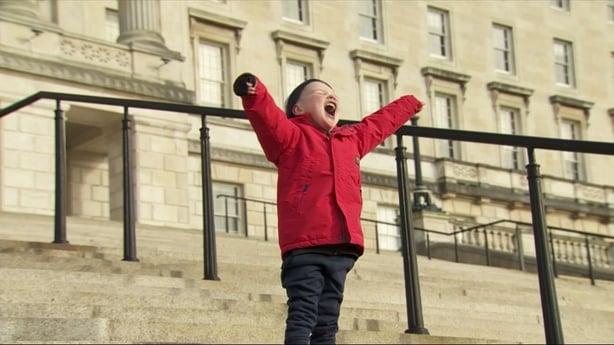The UK's House of Commons has backed a new organ donation law for Northern Ireland, known as "Daithi's Law".
MPs supported the change to the Northern Ireland (Executive Formation) Bill as it passed through its Commons stages.
The bill received an unopposed second reading and will now head to the House of Lords for further scrutiny.
Six-year-old Daithi MacGabhann high-fived his dad when MPs backed the change.
Dáithí's family travelled to Westminster to watch the regulations introduced by the Government clear their Commons stages.
The Government moved to progress the stalled legislation on the opt-out donation system because the political impasse at Stormont means local Assembly members have been unable to convene to pass the regulations.
Speaking at Westminster, Dáithí's father Máirtín MacGabhann said: "It's an emotional day and a very proud day.
"The victory is finally sinking in. I don't think it will fully sink in for a few years maybe.
"We are here, we are outside Westminster, we are going in hopefully to hear the victory that is Dáithí's Law.
"We have met with the Secretary of State (Chris Heaton-Harris) this morning. There was celebration in the air.
"We are just delighted, beyond proud of Dáithí, beyond proud of ourselves and looking forward to Dáithí's Law being implemented.
"Over the past few weeks, we have been let down again and again. We didn't think we would be here today, but we are."
Mr MacGabhann said he expected the bill to get royal assent on 6 March with Dáithí's Law in place for early summer.

Last week, a bid to restore the Assembly to pass the law failed when the DUP again exercised its veto to prevent the election of a speaker, meaning no further business could be conducted.
Northern Ireland Secretary Mr Heaton-Harris said he was taking the "exceptional step" of progressing the legislation at Westminster following cross-party support for the plight of Dáithí.
The opt-out system, which already operates in the rest of the UK, would mean adults in Northern Ireland would be presumed to be donors, unless they took a decision to opt out. It was being implemented to increase donation rates in the region.
The government bill will also delay the requirement for the formation of an executive at Stormont until 18 January next year and delay an Assembly election to 11 April at the latest.
The government said the additional time would allow the Stormont parties "to focus attention on restoring devolved institutions" as well as providing space for continued UK/EU dialogue over the Northern Ireland Protocol.
The DUP collapsed the devolved executive a year ago in protest at the post-Brexit protocol and the party has made it clear it will not lift its block on powersharing until radical changes are made to the contentious Irish Sea trading arrangements.
Mr Heaton-Harris said: "The people of Northern Ireland deserve to have a fully functioning devolved government working on the important issues impacting them and achieving this remains my top priority.
"This bill creates the time and space needed to focus attention on restoring Stormont and for UK/EU negotiations to reach a solution on the NI Protocol that meets the needs of people across Northern Ireland.
"The bill will also see the installation of an 'opt-out' organ donation system.
"While this exceptional intervention by the government is welcome and important, I am disappointed the decision was not taken by locally elected decision-makers in the NI Assembly.
"I will continue to do everything I can to support the parties to come together as soon as possible in the interests of those who elected them."
What is the NI Protocol?
The protocol is part of the Withdrawal Agreement - the international treaty under which the UK left the EU.
It was a compromise to prevent a hard border with checks on goods crossing from Northern Ireland into the Republic of Ireland and the EU's Single Market.
Under the deal, Northern Ireland left the EU along with the rest of the UK.
But the British government accepted that it would stay aligned with the EU’s Single Market rules for goods.
That allowed the checks to be done at Northern Ireland’s ports instead of along the 300-mile land border. It has been dubbed 'The Border in the Irish Sea'.
The EU’s rules on customs and regulation of agri-food products also continue to apply to goods arriving in NI.

